It is June, the time of year when every kind of bug makes its way to my Summerfield, NC garden. I have already seen big fat rust colored potato bugs with a brood of newly hatched babies, aphids on my hellebores, flea beetles on my eggplant, slugs on my hostas, cabbage worms on my kale and kohlrabi, and now the cucumber beetles and Japanese beetles have arrived!
How do gardeners control these thugs without poisoning themselves or the bees and butterflies that are happily floating around the garden?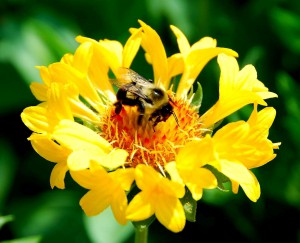
The number one thing to understand is that bugs are your friends. Most are beneficial to your garden, and less than 2% will do any harm at all. Honey bees are only one of about 4000 insects that are helping to pollinate your plants.
Keeping the bad guys in check starts with prevention. Healthy plants have fewer bugs and less disease.
(1) Make sure the pH of your soil is between 6.25 and 6.5 so that plants can more easily take up the nutrients in your soil.
(2) Use lots of compost in your vegetable & flower beds.
(3) Switch to natural fertilizers so that you will be less likely to over fertilize. Too much nitrogen actually weakens your plants, inviting more bugs & disease.
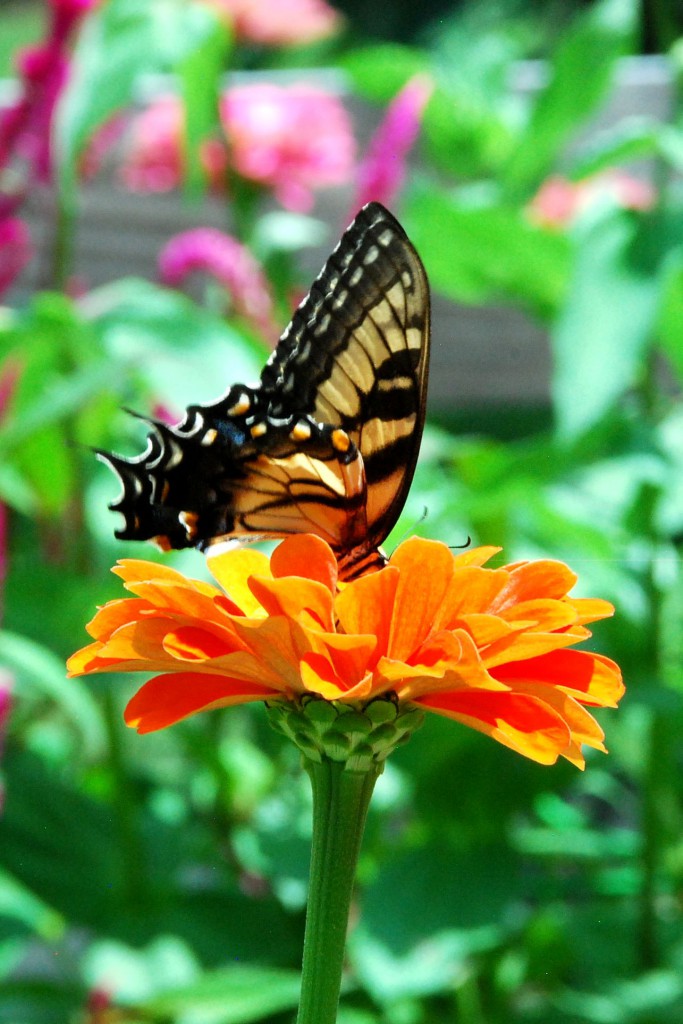
Tiger Swallowtail (another pollinator) on Zinnia
(4) Plant herbs and flowers that attract good bugs to your garden.
(5) Recognize that pesticides, regardless of whether they are “natural”, “organic” or man-made, KILL indiscriminately. Use them only when you see bugs in epidemic proportions that are clearly defoliating your plant.
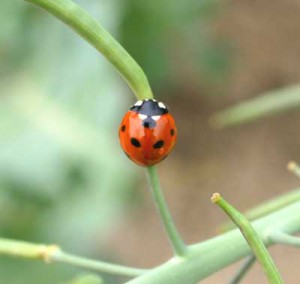
7 spotted lady beetle. Photo by Debbie Roos.
Ever see “good bugs” for sale in garden centers? Won’t a bunch of lady bugs solve the problem?
Beneficial insects like these only stay in your garden if they have something to eat. Lady bugs love aphids. If you have poisoned the aphids, the ladies won’t stay around. Bees and butterflies won’t visit if there are no flowers with pollen. A healthy garden is all about keeping nature in balance.
Here are a few easy organic solutions.
Two days after finding the potato bugs, I came out to see a giant wasp carrying off the last of those fat potato bugs. I could not find one left on the plant! Good bugs took care of the bad.
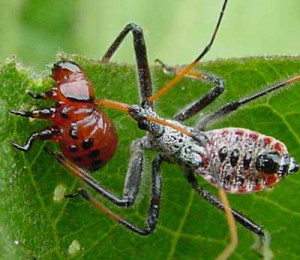
Assassin bug eating potato bug. Photo by Debbie Roos.
If you have ever grown eggplant you know that tiny black flea beetles show up day #1 to riddle the leaves with a thousand holes. A light weight fabric row cover can hide the plant until it is big enough to survive the attack. No spraying required.
Aphids covered everyone’s hellebores this spring. The tiny white insects suck the juice from the leaves and excrete a sticky ‘honey dew” that subsequently turns black with mold. The flowers were affected worse than the leaves. Cut off and bag the old blooms and any sticky black leaves. Spray the rest of the plant with a solution of insecticidal soap. (Do not use dish soap which will burn your plants.)
Cucumber beetles love ornamental amaranth even more than cucumber plants. Plant a “trap crop” of a few amaranth plants that you are not planning to eat. Use an insecticide to kill the beetles on the amaranth instead of your cucumbers. Always wait until just before dark to spray insecticides when most bees have gone to bed.
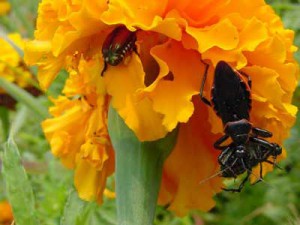
Assassin bug eating Japanese beetle. Photo by Debbie Roos.
Cabbage worms on cruciferous vegetables can be controlled with bacillus thuringiensis, commonly called “BT” (for obvious reasons.) BT is a natural bacteria that kills worms and caterpillars. Spray only the plants that are being eaten.
Slugs on hostas can be controlled with an all-natural bait of 100% iron phosphate. (Sold under various brand names.) Simply sprinkle the pellets around and in the base of the hosta. Check to see if there are not worms eating your hostas too. Pick them off or spray BT to control them.
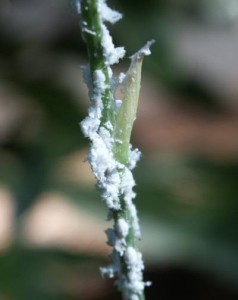
Plant Hopper. Photo by Walter Reeves.
Have you seen the fluffy white stuff on the new growth of your plants? Try touching the white fuzz on your plant. Surprise! Perhaps half a dozen white insects will suddenly hop off the stem in all directions and the white powder will feel a bit sticky. The white insects are juvenile plant hoppers. Plant hoppers do little to harm your plant and can be washed off with a hard spray of water to give a nearby spider or beetle a good meal. You can read more here: http://www.walterreeves.com/insects-and-animals/plant-hoppers-roosting-on-stems/
If you need help identifying an insect in your garden, you will find excellent pictures from Chatham County NC Extension Agent, Debbie Roos at: http://growingsmallfarms.ces.ncsu.edu/growingsmallfarms-pestmanagement/
You can also check the NC State University Extension website for “Pest News” and their “Pest Disease and Insect Clinic”: http://ipm.ces.ncsu.edu/ipm-pest-news/
Perhaps the most destructive practice is that of companies that we hire to rid our yard of mosquitoes.
They dupe us by offering “organic” solutions. Yes, they spray natural BT to kill mosquito larvae, but they drench your entire property with it. Moths, butterflies and lady bugs start life as larvae and caterpillars first! Kill the babies and you will have no beneficial adults.
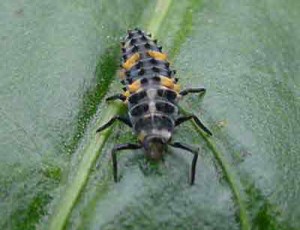
Lady Beetle larva, easily killed with “organic” BT. Photo by Debbie Roos.
For an additional fee, the mosquito squads can “keep your family safe from fleas, ticks, spiders, flies, and gnats… you will be 90% pest free.” What they are spraying is a synthetic form of a natural pesticide that is toxic to every insect in your landscape! Natural or not, it will kill all 4000 pollinators (and your neighbor’s too) plus other beneficial insects such as fireflies, praying mantis, lady bugs, butterflies and so many more! When you poison your insects, you may also be poisoning the birds, bats, frogs and blue tail lizards that eat them.
The number one breeding ground for mosquitoes in Greensboro is English ivy. Each leaf can hold enough water for a mosquito to lay eggs. Solution: Eliminate the ivy and other sources of standing water, and add fans or screens to your outdoor sitting areas.
Being kind to the earth has many paybacks. It will make you a better gardener. It will keep us healthier by reducing the environmental toxins we are subjected to everyday. It will protect the wondrous creatures with whom we share our space.
Ellen
______
Ellen Ashley teaches an annual program of “hands-on” gardening classes on her 10-acre property in Summerfield. Contact her at ellen@learntogarden.anventure.com.


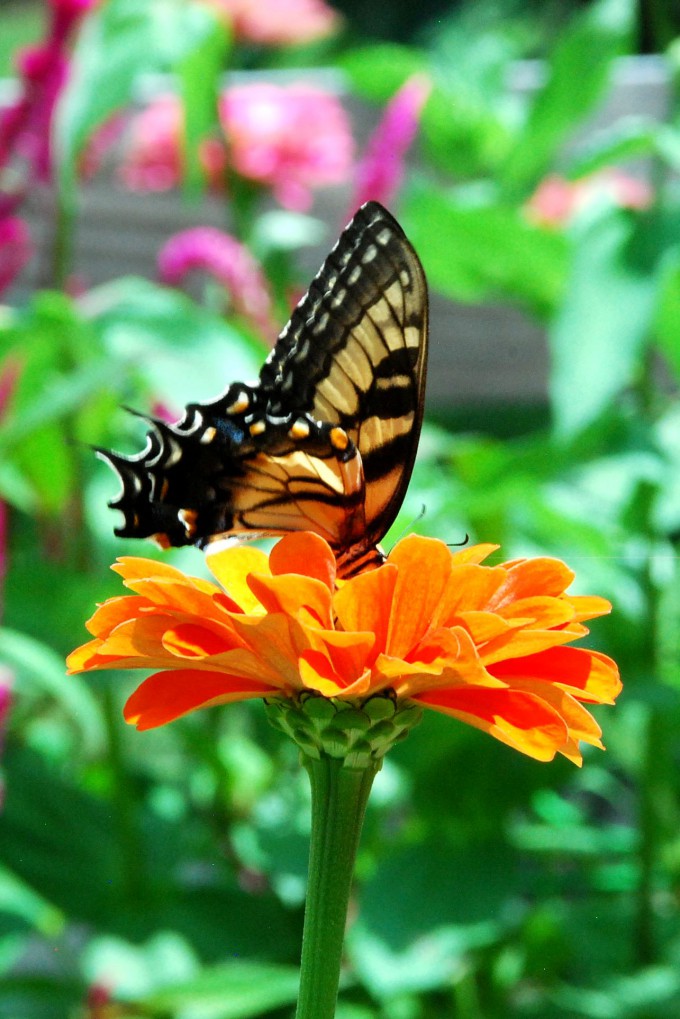







Sometimes I dread going out to the garden because I don’t know what to do about the summer pest invasion!
Thanks, Ellen, for letting me know how easy it is to take care of these bothersome critters, especially that most of them are actually beneficial!
Happy Gardening!